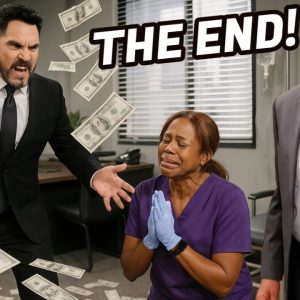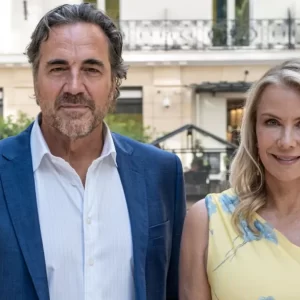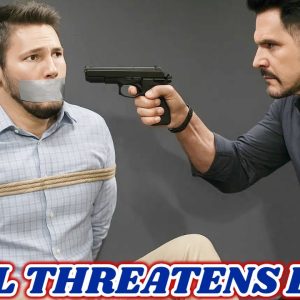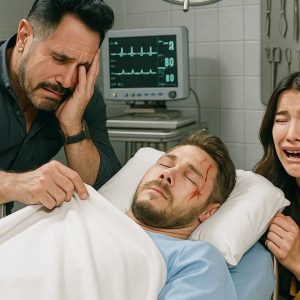Sheila Carter, once the most feared woman in Los Angeles, stepped back into the spotlight not with vengeance—but with remorse. Emerging from over a year in psychiatric treatment, her reappearance was calm, even repentant. Standing beside Deacon, she told the press: “I’m not the woman I used to be… I want to help.”
But not everyone bought it. The shadows of her past—blood, bullets, betrayal—loomed large. Especially for Steffy, who had suffered most at Sheila’s hands. But when tragedy struck again—this time involving Luna Hayes and the illegal weapon that ended her life—Sheila saw an opening. Redemption, in her eyes, would not come from words but from action.
She learned that Luna had purchased the gun from a black market dealer named Griff. Sheila knew the underground well; she’d lived there. And now, she vowed to erase the threat permanently. Deacon was hesitant—he had rebuilt his life, earned Hope’s trust—but Sheila’s resolve was unshakable. “If you want to keep Hope safe, help me end this.”
Together, they tracked Griff to a compound near Malibu. Sheila’s intel was precise, her contacts old and reliable. Griff—a former mercenary turned arms dealer—had no idea what was coming. In a stealth operation under cover of night, Sheila and Deacon breached the compound. One shot, clean and final, ended Griff’s reign. His body was found burned, files destroyed—no trace of who did it. But the whispers spread fast: “Sheila Carter is back.”
Steffy was livid. She exploded at the idea that Sheila believed killing someone equaled redemption. Ridge backed his daughter, furious. Brooke, more pragmatic, questioned whether Sheila had done what the system couldn’t. Even Finn, caught between memories of his mother saving him and the horrors she had committed, hesitated.
Public opinion split. Headlines screamed: “Sheila Carter—Vigilante or Villain?” Hashtags like #JusticeByFire and #RedemptionOrRuin trended. For the first time in decades, Sheila walked through L.A. not as a fugitive—but as a controversial protector. At Hayes’s vigil, she stood in the shadows. Steffy confronted her: “You don’t get to grieve him.” Sheila only whispered back: “I did what none of you would.”
But the city barely had time to recover before the next tragedy struck.
At home in Malibu, Liam was preparing a snack for Kelly when he suddenly collapsed. His daughter’s laughter turned to screams. Stunned and unconscious, Liam was rushed to the hospital. What doctors found shocked everyone: a rare, aggressive tumor deep in the frontal lobe—impacting memory, emotion, and judgment.
Suddenly, the pieces fit. Liam’s erratic choices—his treatment of Hope, his constant flip-flopping, the destruction of peace—were symptoms. But the tumor also forced him to confront a deeper truth. A secret he could no longer keep.
In a raw confession to Steffy, Liam revealed that after Beth’s switch at birth, he had received a DNA result contradicting the lie—but kept silent. “I thought I was protecting her,” he explained. “I thought it would hurt less later.” But Steffy’s face turned to stone. “You let Hope think her daughter was dead longer than she had to?”
The secret exploded. Ridge told Brooke. Brooke told Donna. Donna told Katie. And the news, as it always does in L.A., reached Hope through a whisper and a phone call.
Hope had been healing. She had grown close to Carter—steady, kind, peaceful. But the betrayal shattered everything. She rushed to Liam’s bedside. “You knew she was alive, and you said nothing.” He tried to justify it. “I thought I was helping.” But Hope saw only devastation. “You don’t get to play God with people’s children.”
She walked out. Carter was in the hospital lobby, having heard it all. He reached for her, but Hope wasn’t ready for comfort—not yet.
As the fallout spread, Brooke confronted Liam: “She will never forgive this.” Bill stood silent, seething. “You’ve shamed this family.” Katie tried to defend him, but Donna refused: “Sick or not, he made a choice.”
Hope crumbled. Everything she had rebuilt was gone. Thomas, back from Paris and unaware of the chaos, visited her. “Do you want to be with Carter?” he asked. She didn’t answer—because she didn’t know.
Surgery for Liam was scheduled. The tumor had shifted dangerously close to his optic nerve. As he lay waiting, he told Hope: “If I survive, I won’t try to win you back. I’ll just try to be better—for Beth. For Kelly.”
She didn’t forgive him. But she stayed by his side for a few more minutes.
The surgery was long and uncertain. Doctors offered cautious optimism. “He’s stable… but we won’t know the damage for days.”
Hope went home that night, holding Beth, remembering every scream, every tear, every night she had believed her daughter was gone—pain that might’ve ended sooner had Liam told the truth.
The media erupted. Talk shows revisited the baby switch, the secrets, the betrayals. Families fractured again. The Forresters distanced from Liam. The Logans rallied around Hope. The Spencers scrambled to contain the damage.
As Liam began to recover, speech returning, memory intact but fragile, he knew one thing clearly: There would be no easy redemption. Only the long road to atonement.
Hope, standing between old love and new peace, past agony and a possible future with Carter, had a choice to make. Rebuild—or walk away.
And as for Sheila Carter? She remained—watching, waiting. In her mind, justice had been served. But if L.A. dared cross another line, she’d be ready.
Because this time, she wasn’t hunting for chaos.
She was hunting for justice.





